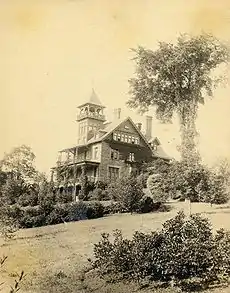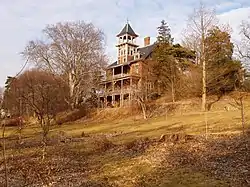Marsh Hall
Marsh Hall, historically known as the Othniel C. Marsh House, is a historic house on Prospect Hill in New Haven, Connecticut. The property, which includes the house and a 6.8 acres (2.8 ha) grounds now known as Marsh Botanical Garden, was declared a National Historic Landmark in 1965. It was built in 1878 as the home of Othniel Marsh (1831–99), a leading 19th-century paleontologist, who occupied it until his death. The house is now owned by Yale University,[3][4] and the building is occupied by the Yale School of the Environment.

Othniel C. Marsh House | |
 Marsh Hall in 2006 | |
  | |
| Location | 360 Prospect Street, New Haven, Connecticut |
|---|---|
| Coordinates | 41°19′19″N 72°55′30″W |
| Area | 6.8 acres (2.8 ha)[1] |
| Built | 1876 |
| Architect | J. Cleaveland Cady |
| Architectural style | Queen Anne Richardsonian Romanesque[2]: 43 |
| Part of | Prospect Hill Historic District (ID79002670) |
| NRHP reference No. | 66000875 |
| Significant dates | |
| Added to NRHP | October 15, 1966[1] |
| Designated NHL | January 12, 1965[3] |
| Designated CP | November 2, 1979 |
Description and history
The house is a 3.5-story brownstone structure, built of red sandstone, overlooking an expanse of landscaped greenery. Its architecture is reminiscent of the Jacobean revival, with asymmetrical massing, and a variety of projections, turrets, and decorative elements. It was designed for Marsh by J. Cleaveland Cady, and construction of the exterior of the main house was largely complete in 1878; it took another three years to finish the interior. The house is one of a relatively small number of Cady designs surviving in the city, and was one of the grandest private residences in the city at the time of its construction.[4]
Othniel Marsh had an interest in fossils from an early age, and studied geology at Yale. Before and after graduating he went on numerous collecting trips throughout northeastern North America, and was appointed the first professor of paleontology. He engaged in repeated expeditions into the American West, sometimes returning with spectacular finds of dinosaurs and other large vertebrates. His finds of Cretaceous winged dinosaurs, complete with teeth and other non-avian features, provided compelling evidence in the debate over the recently published theory of evolution by natural selection. Marsh, a bachelor, bequeathed his estate to the university.[4]
Marsh Hall currently houses offices of the Yale School of the Environment (YSE), and is the home of The Forest School at YSE.[5]
See also
References
- "National Register Information System". National Register of Historic Places. National Park Service. January 23, 2007.
- Ryan, Susan (January 5, 1979). "National Register of Historic Places Inventory-Nomination: Prospect Hill National Register District / Prospect Hill (pages 1-65 of combined PDF)". National Park Service. and Accompanying 12 photos, from 2002 (photo captions at page 79 of text document)
- "Othniel C. Marsh House". National Historic Landmark summary listing. National Park Service. Archived from the original on October 12, 2007. Retrieved October 3, 2007.
- Blanche Higgins Schroer and S. Sydney Bradford (December 4, 1974), National Register of Historic Landmark Nomination: Othniel C. Marsh House (pdf), National Park Service and Accompanying photos, from 1963 and 1974 (1.97 KB)
- "Marsh Hall Directory".
